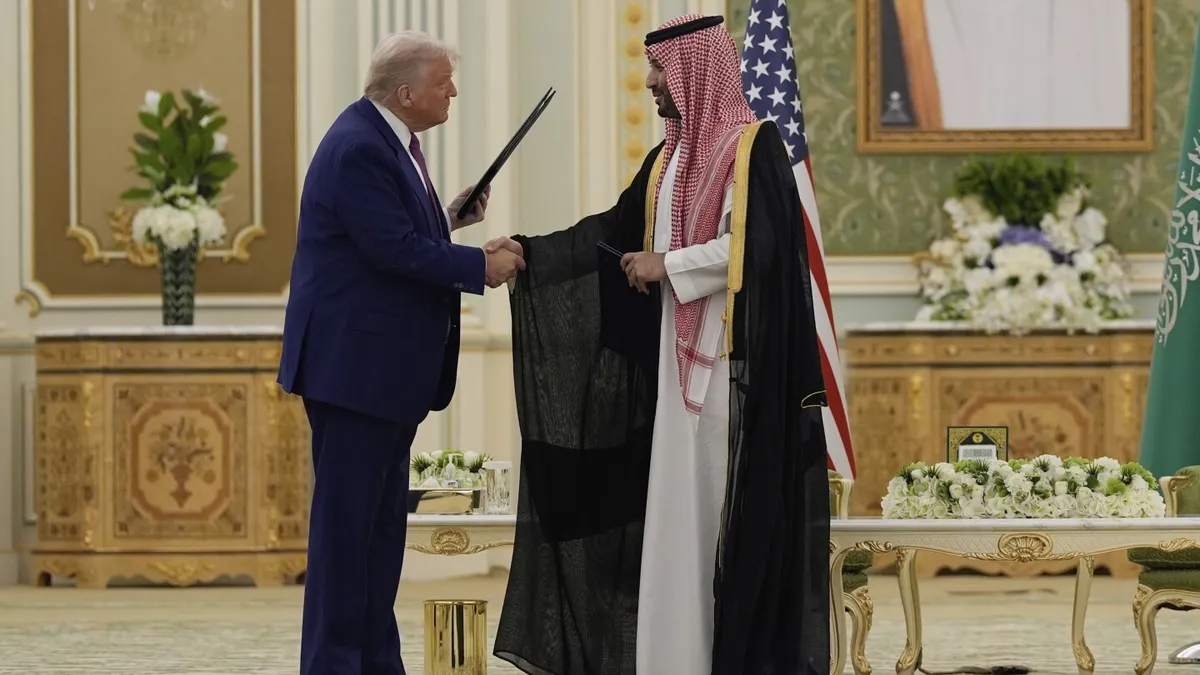
In recent developments, President Donald Trump has come under scrutiny for his extensive business ties in the Middle East, which include accepting a luxurious $400 million plane from Qatar and auctioning off the first destination of his major foreign trip to Saudi Arabia. This trip comes as the kingdom is prepared to invest significantly in U.S. companies. Critics argue that the overlap between Trump's family business interests and his duties as President could lead to preferential treatment towards Middle Eastern leaders regarding U.S. foreign policy.
Before Trump's visit to Saudi Arabia, Qatar, and the United Arab Emirates, his sons, Eric and Donald Jr., embarked on their own journeys across the Middle East. Their mission? To drum up business for The Trump Organization, which they manage while their father serves in the White House. Notably, Eric Trump recently unveiled plans for a grand 80-story Trump Tower in Dubai, the largest city in the UAE, and participated in a cryptocurrency conference alongside Zach Witkoff, a co-founder of the Trump family's crypto firm, World Liberty Financial.
“We are proud to expand our presence in the region,” Eric Trump stated last month, announcing that construction on Trump Tower Dubai is set to commence this fall. The simultaneous timing of Trump's presidential visit and his sons' business pursuits raises questions about the ethical implications of such foreign deal-making.
The Trump family's business interests in the Middle East are substantial. They recently entered into a deal to develop a luxury golf resort in Qatar, in collaboration with Qatari Diar, a company backed by Qatar's sovereign wealth fund. Additionally, they are leasing their brand for two real estate projects in Riyadh, the capital of Saudi Arabia, in partnership with Dar Global, a luxury real estate developer based in London.
The Trump Organization is also working with Dar Global on a new Trump Tower in Jeddah and a forthcoming Trump International Hotel and luxury golf course in Oman. During the cryptocurrency conference, a state-backed investment firm in Abu Dhabi announced a substantial $2 billion investment in Binance, the world’s largest cryptocurrency exchange, which could potentially benefit Trump family-aligned interests.
Another significant concern arises from the relationship between the Trump family and LIV Golf, a Saudi government-backed initiative that has developed close business ties with Trump, including hosting tournaments at his Doral resort in Florida. Jon Hoffman, a research fellow at the Cato Institute, highlighted the glaring conflicts of interest that arise from these connections, noting the extensive ties between LIV Golf and Saudi Arabia's Public Investment Fund.
In January, Trump also announced a $20 billion investment in U.S. data centers from DAMAC Properties, an Emirati company led by billionaire Hussain Sajwani, who has been a long-time business partner of Trump. Despite the president's assurances that these dealings benefit the country, critics argue that they primarily serve the Trump family's financial interests.
When questioned about the potential for Trump to use his trip to engage with individuals linked to his family's business interests, White House press secretary Karoline Leavitt dismissed the concerns as “ridiculous.” She asserted that the president is in full compliance with all conflict of interest laws, emphasizing that Trump's assets are managed by his children in a trust.
While a voluntary ethics agreement prohibits The Trump Organization from entering into deals with foreign governments, it does allow partnerships with private companies abroad, a notable shift from the restrictions during Trump's first term. Although the president is not directly involved in day-to-day decisions for the family business, the intertwining of his political and corporate brands remains evident.
Despite the controversies surrounding his business dealings, Trump has made it clear that the itinerary for his foreign trips is influenced by the promise of investment. His first stop in Saudi Arabia was strategically chosen after the kingdom pledged a staggering $1 trillion in investments in U.S. companies over four years, although the actual commitment has since been revised to $600 billion.
Additionally, the United Arab Emirates has promised $1.4 trillion in investments over the next decade, while Trump has defended accepting a Boeing 747 from the ruling family of Qatar, dismissing security and ethical concerns raised by critics across the political spectrum.
Trump's ventures in the Middle East date back to 2005, during his early years on “The Apprentice.” Although his initial plans for a Trump Tower in Dubai never materialized, his 2017 opening of the Trump International Golf Club in Dubai showcased his longstanding business relationships, particularly with Sajwani. In a past statement, Trump claimed to have turned down a $2 billion deal from Sajwani, asserting his business dealings had no conflicts due to his presidency.
As Trump continues to navigate the complexities of his dual roles as president and businessman, the intersection of his family’s financial interests with U.S. foreign policy raises pressing questions about ethics, accountability, and the potential for conflicts of interest in the realm of international relations.